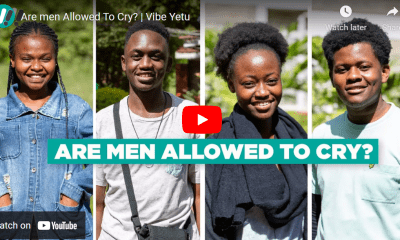Adulting 101
Nimo Gachuiri Talks About Online Bullying of Children.

Nimo Gachuiri, a mother, recording artist, influencer, and entrepreneur shares her experience about managing her child’s online presence. She discusses the challenges she’s encountered and the strategies she employs to safeguard her child online, integrating the principles of the Children Online Protection Act. Shares her insights with DIANA MUCHAI
In today’s digital era, striking a balance between online exposure and safety poses a significant challenge for many parents. Nimo reflects on the initial hurdles she faced when she began sharing about her child online. “When I started posting, we encountered friction with certain groups. We faced bullying, and while I wasn’t initially keen on putting our child out there, his dad was, so I deferred to his lead,” she recalls. The onslaught of negative comments and bullying directed at her child was deeply distressing. “People were calling my baby ugly. It was heart-wrenching,” she adds.
To navigate these challenges, Nimo made the decision to limit her child’s online exposure. “I mainly post about him on my own page, mostly on stories, where feedback is more controlled,” she explains. She perceives her social media as a personal album, a space to preserve memories while exercising control over her child’s visibility.
Nimo stresses the importance of parental controls and monitoring screen time. She encourages outdoor activities and limits screen time, enforcing parental controls on devices such as laptops and Netflix. “We’ve restricted his access to Netflix, emphasizing that it’s not suitable for him. He mostly watches YouTube, where we’ve set up controls to ensure he only views appropriate content,” she explains. By incorporating YouTube Kids on shared devices and using regular YouTube on personal devices, they ensure ongoing safety, even when they’re not actively monitoring his usage. This approach aligns with the Children Online Protection Act’s aim to promote safe internet usage for children, preventing others from corrupting algorithms to suggest age-inappropriate content.
As public figures, Nimo and her husband are deliberate about their online sharing. “We carefully choose what to share. There are aspects we keep private to shield our child from undue scrutiny,” she explains. This deliberate curation aids in managing their child’s online presence while prioritizing his safety. It’s about delineating between their brand and personal lives.
Nimo advocates for building a child’s confidence through affirmations and setting boundaries. “Start by nurturing your child’s confidence. Teach them self-love and resilience,” she advises. They have a daily self-affirmation ritual, fostering self-love and confidence in their child, buffering him against negative comments.
“Utilize parental controls and closely monitor their online activities,” she suggests. She underscores the importance of shielding children until they are equipped to navigate the online world independently.
Nimo Gachuiri’s journey underscores the crucial balance between online exposure and safety. By integrating the principles of the Children Online Protection Act into daily life, parents can cultivate a safer digital environment for their children. The Communications Authority of Kenya, through the Children Online Protection Act, offers a comprehensive framework to shield children from online threats, ensuring a secure digital space for young users. Nimo’s experience serves as a valuable compass for parents navigating the intricacies of raising children in the digital age.
Read About Digital Parenting and Child Empowerment Here.
Adulting 101
Boost Your Business: Essential Tools for Your Small Business


With Kenyans trying to keep up with digital evolution, there isn’t a better time like right now to upgrade your business. Small business tools are crucial for managing and growing operations. These tools assist with project management, marketing and sales, financial management, communication, customer relationship management (CRM), human resources (HR), and e-commerce. We are in the technology revolution era after all.
Why Use Business Tools?
Improved Efficiency: Tools streamline processes and automate tasks, saving time and effort.
Greater Organization: They help track tasks, deadlines, and schedules, ensuring better time and resource management.
Enhanced Communication: Tools facilitate effective communication and collaboration with teams, clients, and stakeholders.
Increased Productivity: Streamlining processes and improving communication boosts productivity.
Better Decision-Making: Access to data and analytics aids in making informed business decisions.
Improved Customer Service: Managing customer interactions helps in providing better service and building strong client relationships.
Below are essential tools for your small business. Handpicked towards improving your business operations and allowing for scalability while efficiency looks to help you time manage.
- Project Management
- Trello: Visual task management with boards, lists, and cards.
- Asana: Advanced features for task assignments and project timelines.
- Marketing and Sales
- Mailchimp: Email marketing platform for creating and tracking campaigns.
- Hootsuite: Social media management for scheduling posts and analyzing performance.
- Financial Management
- QuickBooks: Comprehensive accounting tool for invoicing, payroll, and financial reports.
- Wave: Free invoicing, accounting, and receipt scanning, ideal for freelancers and startups.
- Communication and Collaboration
- Slack: Real-time communication through channels and direct messages.
- Zoom: High-quality video conferencing with screen sharing and recording.
- CRM Tools
- HubSpot CRM: Free CRM for managing contacts, tracking leads, and automating emails.
- Zoho CRM: Affordable CRM for managing sales, marketing, and customer support.
- HR Management
- Gusto: All-in-one platform for payroll, benefits, and compliance.
- BambooHR: Tools for applicant tracking, onboarding, and performance management.
- E-commerce
- Shopify: Comprehensive platform for creating and managing online stores.
- WooCommerce: WordPress plugin for transforming websites into e-commerce stores.
- Notable Mentions
- HubSpot CRM: Manages customer relationships with features like contact management and sales tracking.
- Google Docs: Facilitates document collaboration and cloud storage.
- Google Analytics: Tracks website performance, visitor behavior, and campaign effectiveness.
- Slack: Enhances team communication with real-time messaging and integrations.
- Calendly: Simplifies scheduling with customizable links for clients to book appointments.
- Asana: Organizes tasks, tracks progress, and integrates with other tools for team collaboration.
- Canva: Creates professional marketing materials with customizable templates.
- WordPress: Builds and manages websites with customizable themes and SEO optimization.
- Mailchimp: Manages email marketing with templates, automation, and analytics.
- Hootsuite: Manages social media presence, schedules posts, and analyzes performance.
- Google Ads: Runs targeted advertising campaigns with detailed analytics.
- Moz: Improves SEO with tools for keyword research, link building, and local listing management.
- Evernote: Enhances productivity with note-taking, task management, and collaboration features.
- Google Drive: Offers cloud storage and file sharing with collaborative tools like Google Docs and Sheets.
- Payroll Software: Manages payroll, tax compliance, and time tracking for employees.
Choosing the right business tool is essential for your small business to succeed. These tools enhance efficiency, organization, communication, and customer service. By leveraging the appropriate tools, small business owners can save time, boost productivity, and focus on growth. With Kenya still figuring out the digital landscape, this is the best time to integrate these tools into your business. Do more and reach more.
Adulting 101
What To Do When You Find Out She’s Pregnant


Finding out that your girlfriend, sneaky link or even one-time hook-up is pregnant can be a life-altering moment filled with a mix of emotions. Running through a range of emotions in one go from fear to uncertainty It’s crucial to handle the situation with care, sensitivity, and responsibility regardless of what type of relationship was shared. But remember, no matter how much fear or panic you are going through, she’s going through a lot worse. You’ve never needed to be an empath more than you do now.
First Interaction: How to React
1. Stay Calm
Your initial reaction is critical. It’s natural to feel a surge of emotions—shock, fear, confusion—but try to stay calm. Take a deep breath and compose yourself. She is likely feeling just as overwhelmed, if not a lot more, and will need your support. So that initial reaction grounds her as it grounds you. Remember, you are going to be okay.
2. Listen Actively
Give her the space to express her feelings and thoughts without interruption. Listen to her concerns, fears, and hopes. Show empathy and understanding, and avoid jumping to conclusions or making immediate decisions. Don’t ask whether she’s sure it’s yours, or whether she’s sure the test is positive. Just listen.
3. Acknowledge Her Feelings
Acknowledge her emotions and validate them. Phrases like “I understand this is unexpected” or “It’s okay to feel scared and unsure” can help her feel heard and supported. I mean you both knew the risk with unprotected sex, so denial is only foolish. Acknowledge your own emotions as well.
How Not to React
1. Avoid Blame
Do not blame her or yourself for the situation. Statements like “How could you let this happen?” are unproductive and can cause further stress and hurt. Because what do you mean? This is a both of you situation.
2. Don’t Dismiss Her Feelings
Avoid dismissing or minimizing her feelings by saying things like “It’s not a big deal” or “We’ll figure it out later.” Her feelings are valid and need to be respected. Listen and respond as calmly as you can master, with as much understanding.
3. Don’t Make Rash Decisions
Avoid making any immediate decisions about the future. This is a significant moment that requires thoughtful consideration and discussion.
What to Say
1. Express Support
Let her know that you are there for her. Say something like, “I’m here for you no matter what,” or “We’ll get through this together,” or “You’re going to be okay”
2. Discuss Next Steps Together
Encourage an open discussion about the next steps. Ask questions like, “What do you think we should do?” or “How are you feeling about this?” If you are unable to decide, get professional help, visit the hospital and counsellor with her. Two heads ARE better than one.
3. Reassure Her
Provide reassurance about your commitment to working through this together. For example, “We’ll explore all our options and make the best decision together.” Remember that this decision is hers, but help as much as you can.
What to Do
1. Take Time to Process
Both of you need time to process the news. Take a few days to let the initial shock settle before making any major decisions. Don’t make any panic rush decisions that could endanger her or you further; either emotionally or physically.
2. Educate Yourselves
Learn about your options. This might include speaking with a healthcare provider, counsellor, or trusted family members. Understanding the implications of each option—parenthood, adoption, or abortion—will help in making an informed decision.
3. Communicate Openly
Maintain open and honest communication. Regularly check in with each other to discuss feelings, concerns, and thoughts as you navigate this situation. You have to be with her through it, whether physically or not. Knowing she’s not alone goes a long way.
4. Seek Professional Guidance
Consider seeing a counsellor or a healthcare professional together. They can provide valuable information, support, and guidance during this challenging time.
5. Plan for the Future
Once you’ve discussed and decided on a course of action, start planning for the future. If you decide to continue with the pregnancy, discuss financial, logistical, and emotional preparations. If you choose another option, seek support to navigate that process as well.
An unplanned pregnancy can be a confusing experience, but how you handle the initial reaction can set the tone for how you both move forward. Stay calm, supportive, and open to discussion. You might initially disagree with what the next steps are, but together, you handle it better. Avoid blame and rash decisions and seek professional guidance to make informed choices together. Remember, this is a journey that requires both of you to work as a team, offering each other understanding and support every step of the way. Regardless of whether you move on as a family or not. Remember, you are both going to be okay, breathe.
Adulting 101
Wataonaje? Its Okay to Move On, to Be Happier and for Them to See It


In the aftermath of a fallen friendship or a breakup, the big question is: should you block them on social media? It’s a common impulse to want to erase all traces of someone who may have hurt you or with whom things didn’t end well. However, there’s a compelling argument for keeping that digital door slightly ajar, not enough to let them back in but just enough that if they look, they see. And to ask what Billnas and Rayvanny keep asking, ‘Wataonaje?’.
First, consider the aspect of visibility. By not blocking someone, you allow them a window into your world, one where you continue to grow and thrive without them. This isn’t about nurturing bitterness or showing off; rather, it’s about showcasing your resilience and happiness. When they see how well you’re doing post-breakup or after the friendship has ended, it might prompt some introspection on their part. Perhaps they’ll see what they lost and realize that the issues leading to the fallout were partly, or wholly, their responsibilities.
Allowing an ex-friend or partner to see how you flourish without them can act as a catalyst for personal growth on their part. Sometimes, seeing someone else doing well is a wake-up call that prompts us to reflect on our behaviour and potentially make amends or changes in our lives. If your continued visibility sparks a positive change in them, then keeping the social media lines unblocked serves a higher purpose.
Choosing not to block someone can also be a sign of emotional maturity. It shows that you are secure enough in your own healing process that you don’t need to erase someone’s existence to move forward. This approach can help you transition from any negative feelings towards a place of peace and neutrality. Furthermore, maintaining mutual connections on social media keeps things less awkward for friends or groups shared between you two.
Life is unpredictable, and feelings can evolve. By not blocking someone, you leave open the possibility of reconciliation in the future, should it ever feel appropriate. People grow and change, and the person who might have hurt you once could become a friend or a valuable connection down the road.
Ultimately, the decision to block someone should come down to what you need to heal and move on. However, if you are in a place where you can handle it, keeping them unblocked might just be beneficial. Living well and embracing your happiness without them not only serves as the best kind of personal victory but also stands as a silent testament to your strength and self-worth. Let them see how well you are doing and let that sight remind them of what they might need to change within themselves. Remember, you’re not responsible for their growth, but your own progress might just inspire theirs. So, don’t feel guilty for moving on and being happier—it’s your right and your journey.
-



 A Chat With3 years ago
A Chat With3 years agoA MOMENT WITH SHARON WENDO, FOUNDER OF EPICA JEWELLERY
-



 Entertainment2 years ago
Entertainment2 years agoKenyan Movie Disconnect: The Wedding Planner Is Now Streaming On Netflix
-



 A Chat With2 years ago
A Chat With2 years agoFind out why ‘mutura is not a street food’ as Wanjira Puts it!
-



 A Chat With2 years ago
A Chat With2 years agoAre men allowed to cry?
-



 A Chat With2 years ago
A Chat With2 years agoThey Hooked Up With Their First Serious Boyfriends
-



 A Chat With2 years ago
A Chat With2 years agoA chat with one of the biggest female Djs right now, Dj Redbone
-



 A Chat With2 years ago
A Chat With2 years agoA chat with Atieno: A young radio personnel doing her thing behind the mics
-



 A Chat With2 years ago
A Chat With2 years agoKenyans make the best music in the world, Ayrosh




